-
ORIGINAL ARTICLE12-16-2024
Health literacy development of Primary Health Care patients: qualitative research
Revista Brasileira de Enfermagem. 2024;77(6):e20240154
Abstract
ORIGINAL ARTICLEHealth literacy development of Primary Health Care patients: qualitative research
Revista Brasileira de Enfermagem. 2024;77(6):e20240154
DOI 10.1590/0034-7167-2024-0154
Views0ABSTRACT
Objectives:
to identify the process of health literacy development among primary care patients, relating it to their self-care practices.
Methods:
qualitative, prospective research with 22 patients from two Family Health Strategy units. Data were obtained through individual semi-structured interviews, examined through descriptive statistics and thematic content analysis.
Results:
the results discuss how participants learn about health and how this resonates in their behaviors, culminating in two thematic categories: “Health knowledge construction”; and “Dialogue between health knowledge construction and patient care actions”.
Final Considerations:
health knowledge is developed mainly through interpersonal relationships, mediated by health professionals through bonding and communication. Community educational actions and training of health professionals in communication can promote health literacy and self-care among patients.
Keywords:Chronic DiseaseHealth LiteracyPrimary Health CareQualitative ResearchWorld Health OrganizationSee more
-
ORIGINAL ARTICLE12-16-2024
Analysis of omission of antimicrobial doses in Intensive Care Units
Revista Brasileira de Enfermagem. 2024;77(6):e20240102
Abstract
ORIGINAL ARTICLEAnalysis of omission of antimicrobial doses in Intensive Care Units
Revista Brasileira de Enfermagem. 2024;77(6):e20240102
DOI 10.1590/0034-7167-2024-0102
Views0ABSTRACT
Objectives:
to analyze the rate of antimicrobial dose omission in intensive care units.
Methods:
cross-sectional study carried out between March 1 and September 30, 2023, in intensive care units of a University Hospital in Rio de Janeiro.
Results:
the sample consisted of 452 prescriptions and 1467 antimicrobial doses. The dose omission rate was 4.29%. Each antimicrobial prescribed increased the chance of omission by 51%. The strategy of double-checking prescriptions helped prevent 30% of antimicrobial dose omissions (p=0.0001).
Conclusions:
monitoring the omission of antimicrobial doses can guide nursing actions to improve quality and patient safety, contributing to the prevention of medication errors, antimicrobial stewardship and the fight against antimicrobial resistance.
Keywords:Anti-Infective AgentsAntimicrobial StewardshipIntensive Care UnitsMedication errorsPatient SafetySee more -
REVIEW12-16-2024
Recommendations for guidelines for promoting mental health in the workplace: an umbrella review
Revista Brasileira de Enfermagem. 2024;77(6):e20240086
Abstract
REVIEWRecommendations for guidelines for promoting mental health in the workplace: an umbrella review
Revista Brasileira de Enfermagem. 2024;77(6):e20240086
DOI 10.1590/0034-7167-2024-0086
Views1See moreABSTRACT
Objectives:
to summarize the recommendations of guidelines for promoting mental health in the workplace.
Methods:
an umbrella review, according to Joanna Briggs Institute and Preferred Reporting Items for Systematic reviews and Meta-Analyses methodological assumptions. Data collection was carried out in January 2021 and updated in July 2023 in the American Psychological Association, Cochrane Library, EMBASE, National Library of Medicine, and Scopus databases. Systematic reviews that assessed guidelines with recommendations for mental health care for workers were included. PROSPERO registration CRD42023461845.
Results:
four systematic reviews published between 2015 and 2018 were identified. The abstracts highlighted actions that facilitate and inhibit the recommendations as well as three categories of intervention: primary prevention – worker protection; secondary prevention – promoting workers’ mental health; and tertiary prevention – supporting, monitoring and rehabilitating workers upon returning to work.
Conclusions:
the interventions are based on prevention, promotion and early recognition, support and rehabilitation of mental health problems.

-
ORIGINAL ARTICLE12-16-2024
Psychometric analysis of ProQOL-BR in nursing: building hospital safety and protection
Revista Brasileira de Enfermagem. 2024;77(6):e20240085
Abstract
ORIGINAL ARTICLEPsychometric analysis of ProQOL-BR in nursing: building hospital safety and protection
Revista Brasileira de Enfermagem. 2024;77(6):e20240085
DOI 10.1590/0034-7167-2024-0085
Views0ABSTRACT
Objectives:
to analyze the psychometric properties of the ProQOL-BR instrument in hospital nursing professionals.
Methods:
a methodological study to validate the ProQOL-BR. Confirmatory factor analysis, assessment of local and global adjustment quality, Pearson hypothesis testing and Cronbach’s alpha internal consistency analysis were used.
Results:
a total of 490 professionals participated. The model presents adequate quality due to factor weights (λ≥ 0.40), acceptable overall fit quality and adequate chi-square ratio and degrees of freedom (χ2/g.1=2.51) for the parameters of CFI (0.923), GFI (0.902), TLI (0.914) and RMSEA (0.042). In terms of validity, it was shown to be adequate with CC=0.89. The internal consistency obtained by standardized Cronbach’s alpha was 0.761. Criterion validity was shown to be favorable with significant correlations (0.001).
Conclusions:
the instrument was validated regarding content, criteria and reliability. Three questions were removed from the original instrument, ProQOL-BR, leaving the final instrument with 25 questions.
Keywords:BurnoutHealth Status IndicatorsNursing StaffQuality of Professional LifeValidation Studies as TopicSee more
-
TECHNOLOGICAL INNOVATION12-16-2024
GerenciaDOR™: development of digital technology by nurses for the assessment of patients with chronic pain
Revista Brasileira de Enfermagem. 2024;77(6):e20240050
Abstract
TECHNOLOGICAL INNOVATIONGerenciaDOR™: development of digital technology by nurses for the assessment of patients with chronic pain
Revista Brasileira de Enfermagem. 2024;77(6):e20240050
DOI 10.1590/0034-7167-2024-0050
Views0See moreABSTRACT
Objectives:
to develop a digital technological solution (prototype) for assessing patients with chronic pain.
Methods:
this is a methodological and technological development study based on the Human-Centered Design framework and the principles of Patient-Centered Care. The prototype guides patients through a body diagram and directs them to an evaluation using specific instruments that address the multidimensional aspects of chronic pain.
Results:
the GerenciaDOR* project enables navigation through the Web App screens, providing access to pain assessment features up to the presentation of results.
Final Considerations:
the study describes a systematic approach to pain assessment and expands nurses’ knowledge in pain management. Additionally, it can promote the development of other digital technologies for chronic pain assessment and contribute to a multidisciplinary, patient centered treatment.

-
ORIGINAL ARTICLE12-16-2024
Respectful care for postpartum women with sickle cell disease: a netnographic study
Revista Brasileira de Enfermagem. 2024;77(6):e20230545
Abstract
ORIGINAL ARTICLERespectful care for postpartum women with sickle cell disease: a netnographic study
Revista Brasileira de Enfermagem. 2024;77(6):e20230545
DOI 10.1590/0034-7167-2023-0545
Views0See moreABSTRACT
Objectives:
to analyze principles of respectful maternity care in narratives of postpartum women with sickle cell disease, relating them to Sustainable Development Goals.
Methods:
netnographic study, with two videos published in 2020. Deductive iconographic and thematic analysis by Respectful Maternity Care Charter, organized in MAXQDA.
Results:
principles identified were the right to: freedom from harm and ill-treatment; information, informed consent, refusal of medical procedures, and respect for their choices and preferences including companion; be considered a person from birth, with dignified and respectful treatment; health at the highest possible level; newborns being with their parents or guardians. The Sustainable Development Goals for women by 2030 were not positively contemplated in postpartum women’s experience.
Final Considerations:
it is appropriate that health workers qualify themselves to provide respectful maternity care, with qualified listening, understanding, and resolution of unique demands of postpartum women with sickle cell disease, seeking equality in care for women.

-
ORIGINAL ARTICLE12-16-2024
Construction and validation of an educational game on biosafety in the central sterile supply department
Revista Brasileira de Enfermagem. 2024;77(6):e20230478
Abstract
ORIGINAL ARTICLEConstruction and validation of an educational game on biosafety in the central sterile supply department
Revista Brasileira de Enfermagem. 2024;77(6):e20230478
DOI 10.1590/0034-7167-2023-0478
Views0See moreABSTRACT
Objectives:
to construct and validate an educational game on biosafety in the Central Sterile Supply Department of a hospital in Curitiba, PR.
Methods:
the study was conducted using a quantitative approach, employing applied and technological research with an exploratory design. The process was divided into six stages, from the definition of the theme to the validation and application of the game. The study was carried out from May to August 2022, involving 17 nursing professionals from a Central Sterile Supply Department during day and night shifts, as well as 9 judges.
Results:
the study resulted in the construction of a board game named by the authors as “My Health First.”
Conclusions:
the research achieved its objective of constructing and validating an educational game. By reflecting on professional practice and correlating the occupational risks present, the professionals were able to list safe actions, identify problems, and seek solutions.

-
ORIGINAL ARTICLE12-16-2024
Training profile of intensive care nurses in Brazil: cross-sectional study
Revista Brasileira de Enfermagem. 2024;77(6):e20230460
Abstract
ORIGINAL ARTICLETraining profile of intensive care nurses in Brazil: cross-sectional study
Revista Brasileira de Enfermagem. 2024;77(6):e20230460
DOI 10.1590/0034-7167-2023-0460
Views0ABSTRACT
Objectives:
to describe the training profile of Brazilian intensive care nurses.
Methods:
a cross-sectional study carried out in two stages: a structured, self-administered questionnaire; mapping of the national supply of lato sensu postgraduate courses. Data was collected on the sociodemographic profile, training process and characterization of the courses.
Results:
in the first stage, 202 respondents were obtained. The majority were women (79.2%), aged between 26 and 45 (80.7%), graduated less than 5 years ago (44%), through lato sensu postgraduate courses (55.5%), which were marked by the absence of laboratory practice (57.5%) and guided tours (42.5%). In the second stage, 457 courses were identified, with face-to-face teaching (58.9%), a workload of 360 to 420 hours (51.2%), a duration of up to 6 months (41.8%) and variation in the sub-area of training.
Conclusions:
there was a predominance of professionals graduating from lato sensu post-graduate courses, with essentially theoretical teaching and heterogeneity in terms of modality, workload and sub-area of training.
Keywords:Critical Care NursingEducationIntensive Care UnitsNursing EducationNursing, GraduateProfessional PracticeSee more
-
ORIGINAL ARTICLE12-13-2024
Nurses’ experience regarding patient safety in mobile pre-hospital care
Revista Brasileira de Enfermagem. 2024;77(5):e20230529
Abstract
ORIGINAL ARTICLENurses’ experience regarding patient safety in mobile pre-hospital care
Revista Brasileira de Enfermagem. 2024;77(5):e20230529
DOI 10.1590/0034-7167-2023-0529
Views0See moreABSTRACT
Objectives:
to understand nurses’ experience regarding patient safety in mobile pre-hospital care.
Method:
a qualitative, exploratory and descriptive study, conducted with nurses active in mobile pre-hospital care services. Semi-structured interviews were conducted, audio-graved and submitted to Bardin’s content analysis.
Results:
from four thematic categories established, nurses reported the care and management skills necessary to work in this service. They demonstrated a commitment to ensuring safe care for patients, staff and spectators. They highlighted the actions taken to prevent and mitigate incidents. However, they based their experiences on practice protocols and individual actions, expressing the need to improve knowledge about patient safety.
Final Considerations:
mobile pre-hospital care nurses’ experience in relation to patient safety was limited, suggesting the need for training on the subject, alignment of work processes and implementation of strategies, aiming to guarantee safe care.
-
ORIGINAL ARTICLE12-13-2024
Repercussions of the pandemic on tuberculosis control actions from the perspective of health professionals
Revista Brasileira de Enfermagem. 2024;77(5):e20230477
Abstract
ORIGINAL ARTICLERepercussions of the pandemic on tuberculosis control actions from the perspective of health professionals
Revista Brasileira de Enfermagem. 2024;77(5):e20230477
DOI 10.1590/0034-7167-2023-0477
Views0See moreABSTRACT
Objectives:
to analyze the repercussions of the COVID-19 pandemic on tuberculosis control actions from the perspective of primary health care professionals.
Methods:
this descriptive study with a qualitative approach was conducted from November 2022 to April 2023, using semi-structured interviews with 11 key informant professionals from primary health care units in a Brazilian capital. Data were organized using Atlas.ti 22.0 software and subjected to thematic-categorical content analysis.
Results:
the pandemic scenario caused alterations in the work process, necessitating abrupt adaptations, and led to detrimental impacts on the health of professionals and tuberculosis control actions, which were reduced or discontinued.
Final Considerations:
there was evident unpreparedness and a lack of resources from various governmental levels and health services to handle the public health emergency situation without severe harm to the provision of essential services.
-
Training of Brazilian indigenous nurses: between human rights, valuing diversity and inclusion
Revista Brasileira de Enfermagem. 2024;77(5):e20230430
Abstract
Training of Brazilian indigenous nurses: between human rights, valuing diversity and inclusion
Revista Brasileira de Enfermagem. 2024;77(5):e20230430
DOI 10.1590/0034-7167-2023-0430
Views0See moreABSTRACT
Objectives:
to analyze the possibilities and potential of training indigenous nurses, given the Brazilian Health System (SUS), understanding the relationships between education and health.
Methods:
theoretical-reflective study, based on scientific literature, aligned with the experience, critical thinking of its authors and the Sustainable Development Goals in Brazil.
Results:
this text articulates three axes: Potential for including indigenous students in nursing training; Paths to achieving equity through inclusion and retention policies for indigenous students at different levels; and Implications of this for the SUS and global health.
Final Considerations:
indigenous students, beneficiaries of affirmative actions, face challenges of inclusion and retention in public universities that directly impact their academic training. Added to this are the difficulties identified in basic education, professor training and implementation of permanence policies, with consequences for services and training at other levels.
-
ORIGINAL ARTICLE12-13-2024
Interobserver agreement in Reception and Risk Stratification in Obstetrics implementation
Revista Brasileira de Enfermagem. 2024;77(5):e20230361
Abstract
ORIGINAL ARTICLEInterobserver agreement in Reception and Risk Stratification in Obstetrics implementation
Revista Brasileira de Enfermagem. 2024;77(5):e20230361
DOI 10.1590/0034-7167-2023-0361
Views0See moreABSTRACT
Objectives:
to analyze interobserver agreement in the Reception and Risk Stratification in Obstetrics protocol implementation.
Methods:
a cross-sectional study carried out during Reception and Risk Stratification in Obstetrics implementation, conducted in a tertiary hospital in southern Brazil with 891 participants in January 2020. Descriptive and interobserver agreement analysis was carried out using the Kappa coefficient in the risk stratification assigned by the triage nurse and reviewed by the researcher.
Results:
around half of the calls (55.6%) were stratified as not very urgent (green), followed by urgent (yellow) (31.8%), very urgent (orange) (9.3%), not urgent (blue) (3.4%) and no emerging stratification (red). Agreement analysis of revised stratification found Kappa values of 0.20 (blue), 0.54 (green), 0.77 (yellow) and 0.80 (orange).
Conclusions:
most appointments were non-urgent. The agreement analysis between the revised and assigned risk stratification revealed greater interobserver agreement as the priority level increased.
-
ORIGINAL ARTICLE12-13-2024
Adaptation and implementation of a Nursing care protocol for children in the Amazon Region
Revista Brasileira de Enfermagem. 2024;77(5):e20230245
Abstract
ORIGINAL ARTICLEAdaptation and implementation of a Nursing care protocol for children in the Amazon Region
Revista Brasileira de Enfermagem. 2024;77(5):e20230245
DOI 10.1590/0034-7167-2023-0245
Views0See moreABSTRACT
Objectives:
to describe the process of implementing an adapted protocol for pediatric nursing care in a health unit located in a municipality in the Amazon Region.
Methods:
methodological research conducted in a basic health unit with four family health teams in the state of Rondônia, involving seven nursing professionals. Data collection occurred between October 2020 and April 2022, following the research phases: situational diagnosis, exploratory phase, protocol definition, implementation, and evaluation.
Results:
the outcome was the adaptation and implementation of a nursing care protocol for children.
Final Considerations:
the adaptation and implementation process can be an effective approach to improving care, strengthening nursing as a profession with a solid foundation in scientific and clinical evidence. This facilitates early problem identification and appropriate guidance, leading to better health outcomes for children.
-
ORIGINAL ARTICLE12-13-2024
Nurses’ experiences in caring for people with mental health problems hospitalized due to clinical comorbidities
Revista Brasileira de Enfermagem. 2024;77(5):e20230136
Abstract
ORIGINAL ARTICLENurses’ experiences in caring for people with mental health problems hospitalized due to clinical comorbidities
Revista Brasileira de Enfermagem. 2024;77(5):e20230136
DOI 10.1590/0034-7167-2023-0136
Views0See moreABSTRACT
Objectives:
to understand nurses’ experiences in caring for people with mental health problems hospitalized due to clinical comorbidities in non-psychiatric Inpatient Units.
Methods:
qualitative study, guided by Alfred Schutz’s social phenomenology. Sixteen phenomenological interviews were conducted. The content was analyzed and discussed based on the literature, through the composition of three categories of analysis.
Results:
three categories emerged in the study: Challenges in care faced by nurses; Fragmented care action; and Ideal care. The disarticulation of the clinic was revealed, as described by nurses, showing care as an action far removed from the comprehensiveness of a person. Nurses’ performance is guided predominantly by biomedical reference, disregarding appreciation of subjectivity.
Final Considerations:
it was observed that nurses attribute the responsibility for patient care to factors external to their life-world, when, in fact, these aspects should be components that help them in comprehensive care construction.
-
REVIEW11-29-2024
Assessment of knowledge in oncology about care for transgender people: a scoping review
Revista Brasileira de Enfermagem. 2024;77:e20230532
Abstract
REVIEWAssessment of knowledge in oncology about care for transgender people: a scoping review
Revista Brasileira de Enfermagem. 2024;77:e20230532
DOI 10.1590/0034-7167-2023-0532
Views0ABSTRACT
Objective:
to identify evidence available in the literature on instruments and methodologies used to assess healthcare professionals’ knowledge about cancer care for the transgender population.
Methods:
a scoping review was conducted in seven databases, including studies that answered the question: what is the healthcare professionals’ level of knowledge about cancer care for the transgender population?
Results:
forty-one articles were selected that dealt specifically with healthcare professionals’knowledge in relation to care for the LGBTQIAPN+ population, especially the transgender population. Eighteen studies assessed patients’ perceptions of professionals’knowledge, whereas other studies used their own assessment tools, considering the global context of LGBTQIAPN+ health.
Conclusions:
there is no tested and validated instrument that assesses the knowledge about the transgender population’s oncological health, highlighting the need to construct and validate an instrument focused on this population’s needs.
Keywords:Health Services for Transgender PeopleNeoplasmsOncologyProfessional TrainingTransgender PeopleSee more
-
ORIGINAL ARTICLE10-17-2022
Supervision of the professional practice of nursing: case study describing the “on-site inspection” sub-process
Revista Brasileira de Enfermagem. 2022;75(2):e20210823
Abstract
ORIGINAL ARTICLESupervision of the professional practice of nursing: case study describing the “on-site inspection” sub-process
Revista Brasileira de Enfermagem. 2022;75(2):e20210823
DOI 10.1590/0034-7167-2021-0823
Views0ABSTRACT
Objectives:
to describe the “On-site inspection” sub-process of the macroprocess “Supervision” conducted at the headquarters unit of the Regional Nursing Council of São Paulo.
Methods:
an exploratory descriptive research, in a single case study modality using data reported by the Headquarters Unit Inspection Management leaders.
Results:
the description of the “On-Site inspection” sub-process, initial and return, showed how the activities/tasks pre-established in the inspection roadmap and inserted in the respective inspection terms need to be accurately and sequentially executed to comply with the current legislation and provided the identification of activities that add value to the inspection process.
Conclusions:
the results obtained give visibility to the activities/tasks developed by the inspectors and will provide the Inspection Management with subsidies for the rational allocation of the required human resources; and, to the technical managers and legal representatives of the inspected institutions, the knowledge of the activities developed during the performance of the sub-process “On-site inspection”.
Keywords:Health Care Coordination and MonitoringNursing ServicesOrganization and AdministrationProfessional Review OrganizationsWorkflowSee more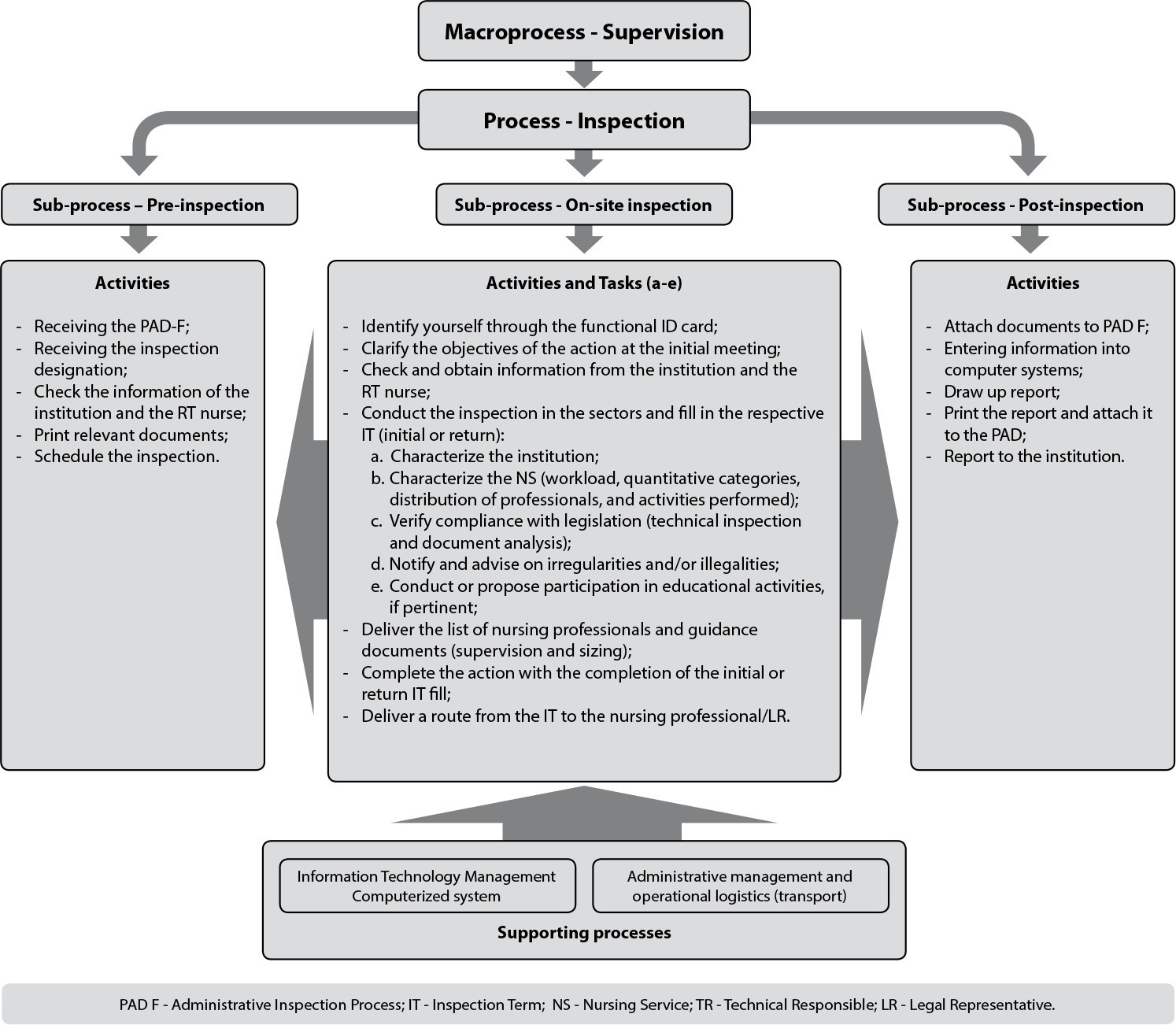
-
REVIEW10-17-2022
Authentic leadership in nurses’ professional practice: an integrative review
Revista Brasileira de Enfermagem. 2022;75(1):e20210972
Abstract
REVIEWAuthentic leadership in nurses’ professional practice: an integrative review
Revista Brasileira de Enfermagem. 2022;75(1):e20210972
DOI 10.1590/0034-7167-2021-0972
Views0See moreABSTRACT
Objectives:
to identify the primary constructs concerning authentic leadership and its relevance for nurses’ professional practice.
Methods:
integrative literature review conducted between 2015 and 2020 in LILACS, SciELO, and PubMed databases.
Results:
the United States published most of the 31 studies analyzed, with eight studies (25.8%), followed by Canada with seven studies (22.6%), and Brasil with five (16.1%). Most studies adopted a quantitative approach (77.41%), and 96.8% presented weak evidence. Three categories emerged: Work Engagement/Job Satisfaction and Organizational Commitment; Healthy Work Environment; and Intention to Quit the Job and Mental Exhaustion.
Final Considerations:
authentic leadership positively contributes to management and nursing care practice, promoting healthy work environments, structural empowerment, greater work engagement, and organizational commitment, decreasing absenteeism and mental exhaustion.
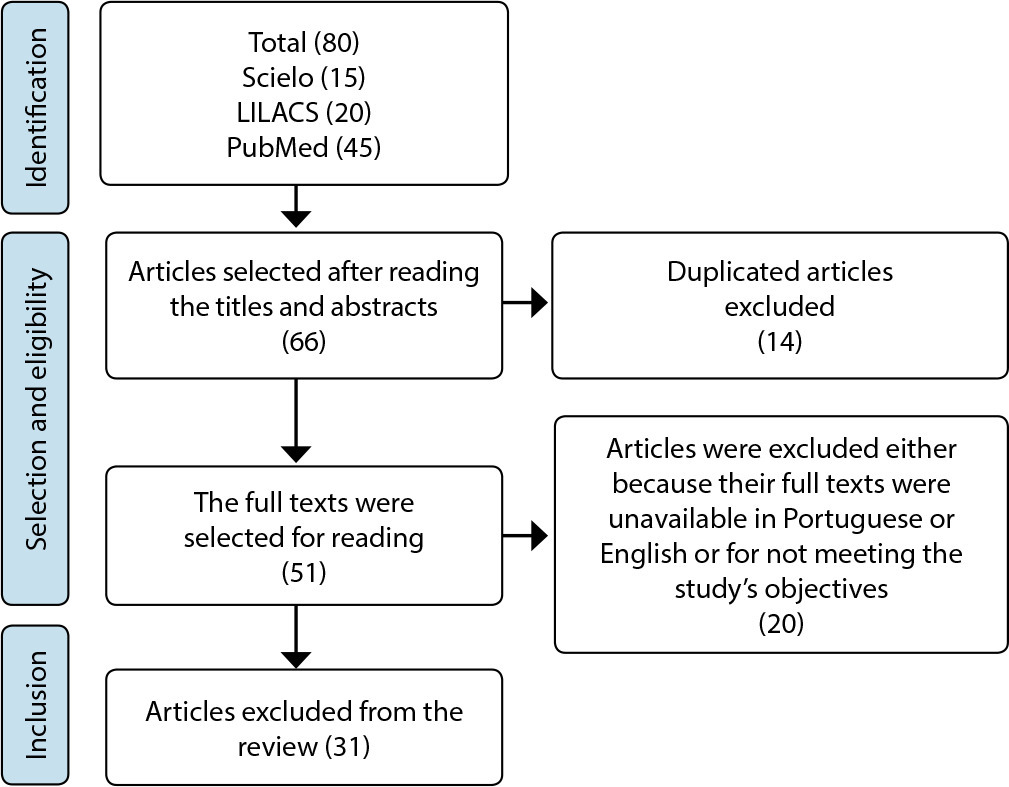
-
REVIEW10-07-2022
Strategies for thirst management in postoperative adult patients: a scoping review
Revista Brasileira de Enfermagem. 2022;75(4):e20220154
Abstract
REVIEWStrategies for thirst management in postoperative adult patients: a scoping review
Revista Brasileira de Enfermagem. 2022;75(4):e20220154
DOI 10.1590/0034-7167-2022-0154
Views0See moreABSTRACT
Objectives:
to map the strategies for managing thirst in postoperative adult patients.
Methods:
scoping review was conducted in October 2021 in 19 data sources: 14 databases and 5 platforms to search in the grey literature. It was prepared according to the recommendations of the Joanna Briggs Institute and the checklist of the Preferred Reporting Items for Systematic reviews and Meta-Analyses extension for Scoping Reviews. Nine selected articles were part of the final sample.
Results:
there is evidence of strategies to manage postoperative thirst using interventions such as water, ice, mentholated measures, carbohydrate and protein enriched fluid, oral hydrator, flavored gargling, cold gargling, wet gauze, 0.75% citric acid spray, and cold water.
Final Considerations:
the strategies observed may be reduced to cold and menthol use, salivary stimulants, and early introduction of fluids. The outcomes were positive in all the studies reviewed.
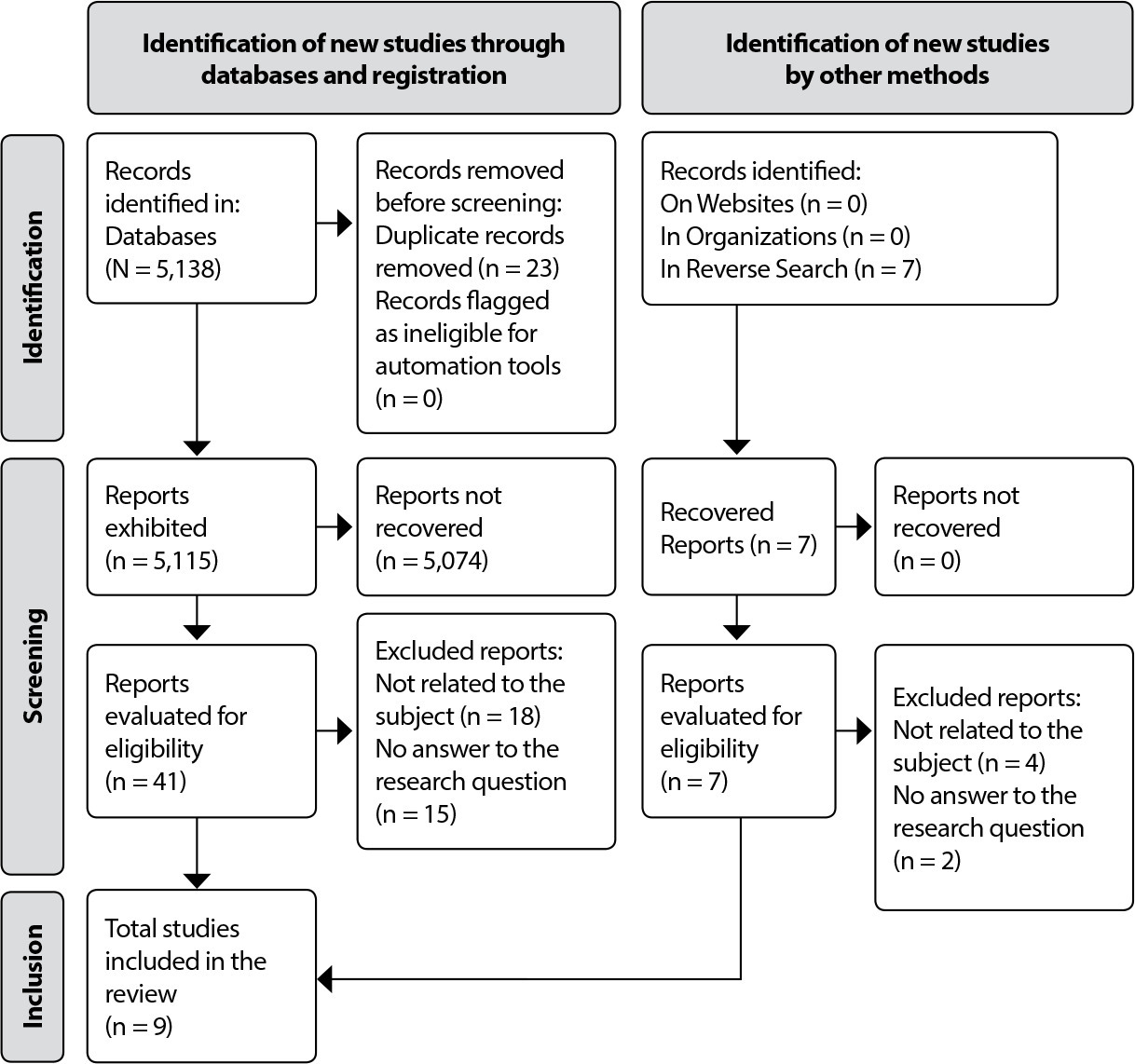
-
ORIGINAL ARTICLE10-07-2022
Perception of men perpetrators of violence about paternity
Revista Brasileira de Enfermagem. 2022;75(4):e20210890
Abstract
ORIGINAL ARTICLEPerception of men perpetrators of violence about paternity
Revista Brasileira de Enfermagem. 2022;75(4):e20210890
DOI 10.1590/0034-7167-2021-0890
Views0See moreABSTRACT
Objectives:
to learn about the perception of men in the judicial process due to spousal violence about paternity.
Methods:
a descriptive, qualitative study with nine men in the judicial process due to spousal violence. Data were collected through interviews; the men validated the data, which were systematized by the categorical thematic content analysis, and analyzed in light of scientific texts that discuss the subject.
Results:
the study allowed the creation of three categories: the father is the example for the son; the father must provide for the son’s needs; the father corrects the son.
Conclusions:
that context reveals the need to re-signify paternity to influence children’s education positively.
-
ORIGINAL ARTICLE10-07-2022
Construction and validation of a serial album for companions of patients with stroke
Revista Brasileira de Enfermagem. 2022;75(4):e20210843
Abstract
ORIGINAL ARTICLEConstruction and validation of a serial album for companions of patients with stroke
Revista Brasileira de Enfermagem. 2022;75(4):e20210843
DOI 10.1590/0034-7167-2021-0843
Views0See moreABSTRACT
Objectives:
to construct and validate a serial album, to be used in hospital discharge planning of patients with stroke.
Methods:
a methodological study, with construction of a serial album, validity by 22 judges and assessment by 22 companions. Data were collected from the Health Education Content Validity Instrument, with the companions, from the Suitability Assessment of Materials.
Results:
the serial album has 21 pages. The overall Content Validity Index was equal to 0.87 among expert judges and 1.0 among companions.
Conclusions:
the educational technology constructed was considered valid by the judges and assessed as understandable by the companions so that it presented itself as a viable technological resource for use in the health education of companions of patients with stroke.
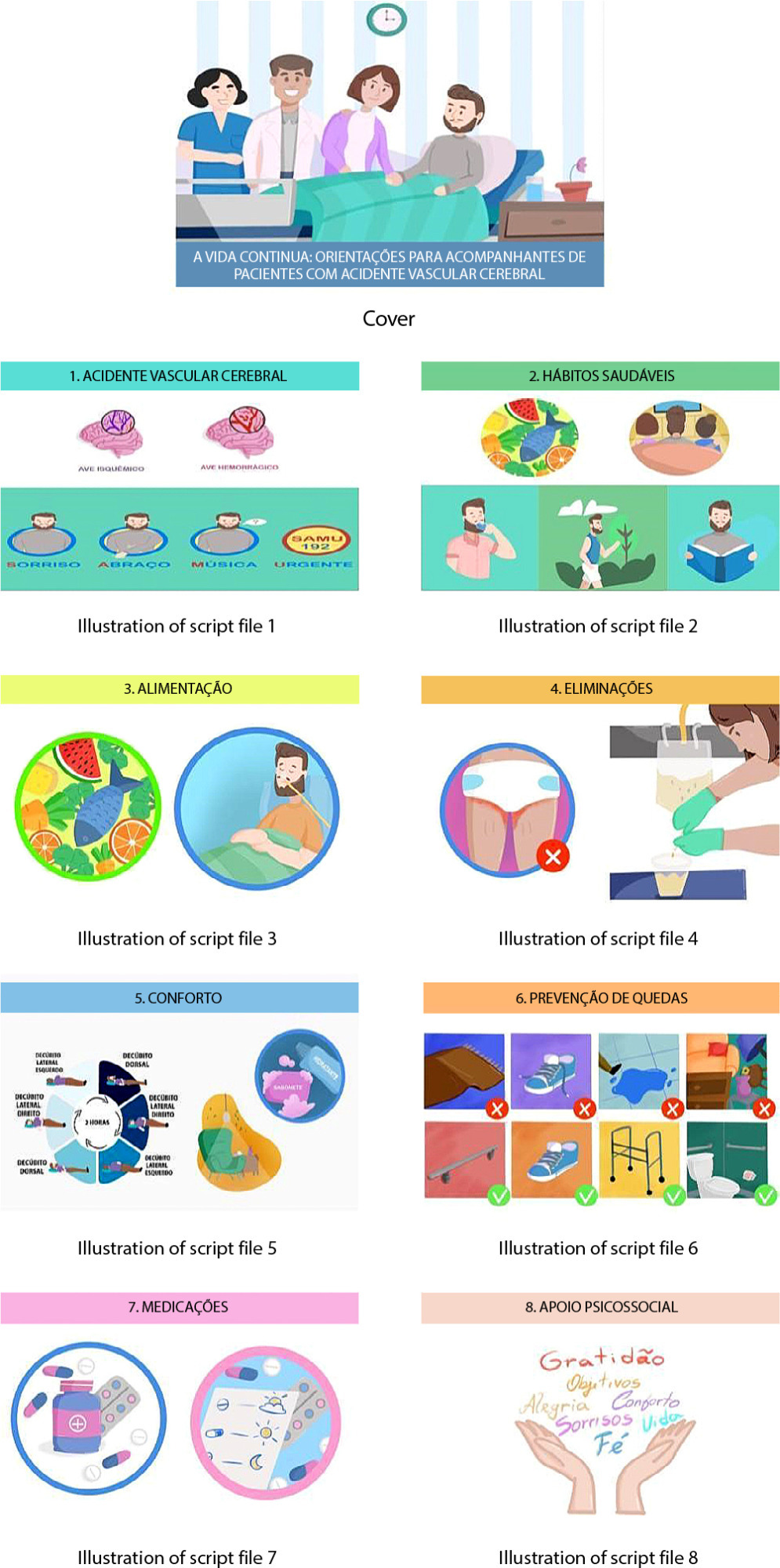
-
ORIGINAL ARTICLE10-07-2022
Violence against nursing workers: repercussions on patient access and safety
Revista Brasileira de Enfermagem. 2022;75(4):e20210765
Abstract
ORIGINAL ARTICLEViolence against nursing workers: repercussions on patient access and safety
Revista Brasileira de Enfermagem. 2022;75(4):e20210765
DOI 10.1590/0034-7167-2021-0765
Views1See moreABSTRACT
Objectives:
to analyze the repercussions of violence against nursing professionals, in the access and safety of patients in Family Health Strategy.
Methods:
a mixed study, with 169 nursing professionals. We used a socio-labor questionnaire, Survey Questionnaire Workplace Violence in the Health Sector, a patient safety instrument and interviews.
Results:
verbal aggression was related to support (p=0.048), respect (p=0.021), hours of care (p=0.047) and patient safety behaviors (p=0.033) among professionals. Suffering from bullying was related to fear of questioning when something is wrong (p=0.010) and lack of support from management (p=0.016). Victims of physical violence felt that their mistakes could be used against them. Mixed data converge and confirm that violence affects professional behavior and puts Primary Health Care attributes at risk.
Conclusions:
violence affects workers’ behavior, interferes with the care provided, weakens the access and safety of patients.
-
ORIGINAL ARTICLE10-07-2022
Nursing workload associated with neonatal mortality risk: a cross-sectional study
Revista Brasileira de Enfermagem. 2022;75(4):e20200965
Abstract
ORIGINAL ARTICLENursing workload associated with neonatal mortality risk: a cross-sectional study
Revista Brasileira de Enfermagem. 2022;75(4):e20200965
DOI 10.1590/0034-7167-2020-0965
Views0See moreABSTRACT
Objectives:
to analyze the association between nursing workload and neonatal mortality risk in newborns admitted to the Neonatal Intensive Care Unit.
Methods:
this is an observational, cross-sectional study conducted from January 2019 to January 2020.
Results:
the sample consisted of 399 newborns, 55.4% male, Nursing Activities Score mean of 67.5%, and Score for Neonatal Acute Physiology Perinatal Extension mean of 17.7, revealed itself as a predictor of the risk of death, while gestational age, length of hospitalization, and the first-minute Apgar established a protective relationship. The correlation between workload and neonatal mortality was low (r= 0.23, p=0.0009).
Conclusions:
the workload of the nursing team is not associated with the risk of mortality in the Neonatal Intensive Care Unit, as measured by the Nursing Activities Score.
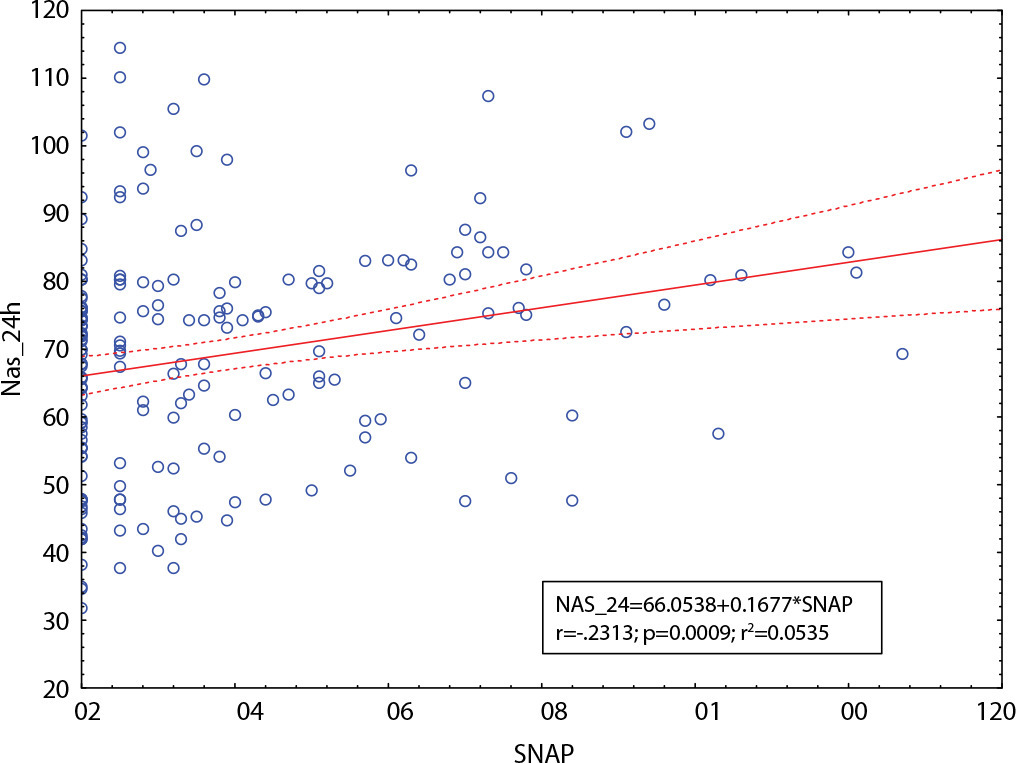
-
REVIEW10-03-2022
Intravenous therapy device labeling in Intensive Care Units: an integrative review
Revista Brasileira de Enfermagem. 2022;75(6):e20220049
Abstract
REVIEWIntravenous therapy device labeling in Intensive Care Units: an integrative review
Revista Brasileira de Enfermagem. 2022;75(6):e20220049
DOI 10.1590/0034-7167-2022-0049
Views0See moreABSTRACT
Objectives:
to synthesize the evidence on intravenous device labeling used to identify medications administered to patients in Intensive Care Units, with a view to preventing medication errors.
Methods:
an integrative review, in the LILACS, IBECS, Embase, MEDLINE, Scopus, Web of Science and CINAHL databases, from November to December 2021, using descriptors and selection criteria. Data were collected in 11 articles and subsequently classified, summarized and aggregated.
Results:
pre-designed labels, with pre-defined colors and information, help to prevent medication identification errors. There is still a lack of standardization in the practice of labeling syringes, intravenous lines, infusion pumps and saline solution bags. There are errors related to the lack of labeling devices or to their performance with incomplete information.
Conclusions:
device labeling is a barrier to defending the medication system safety and should be standardized.
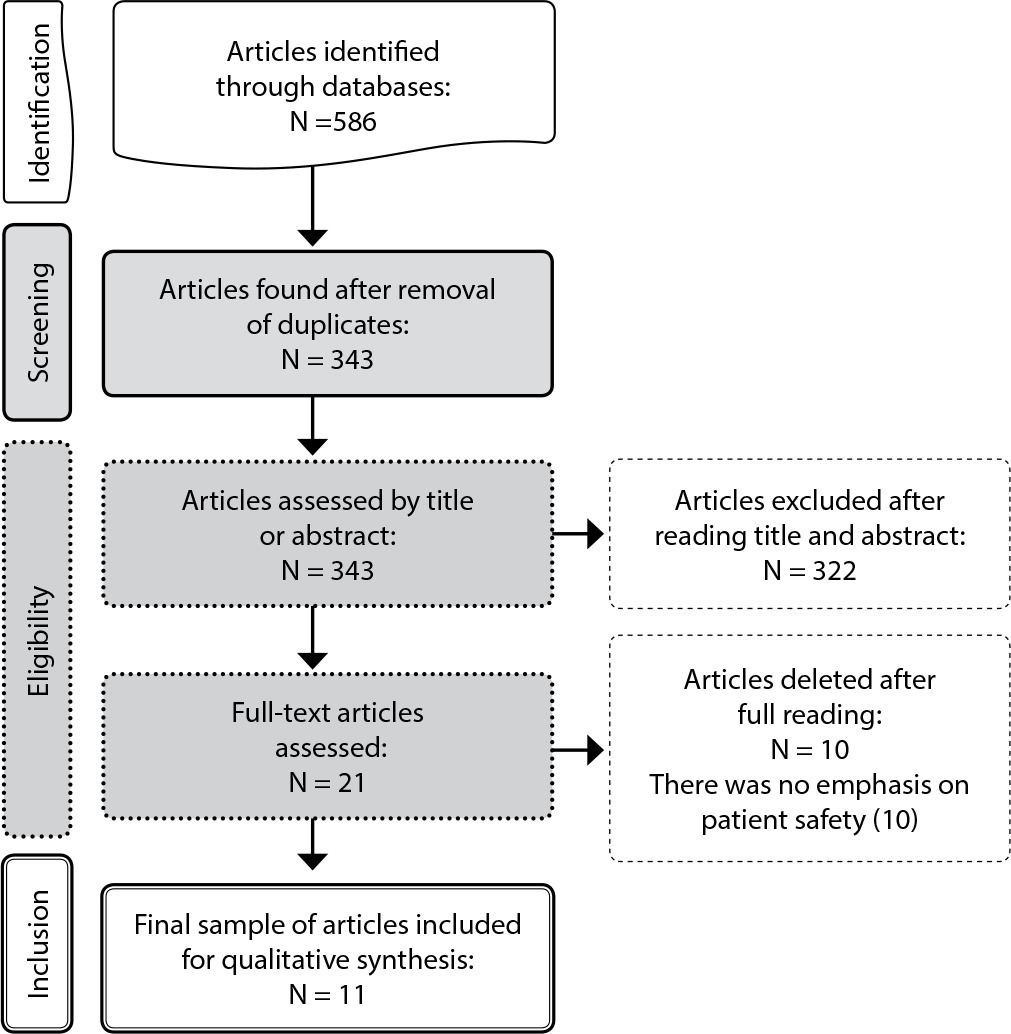
Search
Search in:
Nuvem de Tags
Aged (144) Atenção Primária à Saúde (239) COVID-19 (104) Cuidados de Enfermagem (269) Educação em Enfermagem (151) Educação em Saúde (139) Enfermagem (930) Estudos de Validação (131) Health Education (144) Idoso (208) Mental Health (149) Nursing (987) Nursing Care (306) Patient Safety (151) Primary Health Care (284) Qualidade de Vida (104) Quality of Life (106) Saúde Mental (145) Segurança do Paciente (150) Validation Studies (108)



